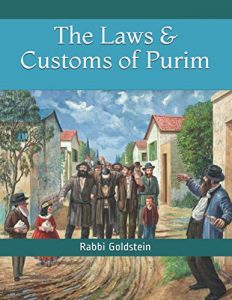Post Views: 2,047
*As an Amazon Associate I earn from qualifying purchases.
WhatsApp
Facebook
Twitter
Telegram
Summary of laws-Megillah reading-Part 3:
- Who is obligated in the Megillah reading? Every Jew is obligated in the Megillah reading. This obligation includes women. Children [boys and girls, who have reached the age of Chinuch], are to be educated to hear the Megillah once by night and once by day. [Very small children are not to be brought to shul if they will disturb and make noise.]
- When is it read? One is obligated to read [or hear] the Megillah both on the night of Purim and again the next day. One may fulfill his obligation of reading the Megillah at night, anytime throughout the night of Purim. One may begin reading the Megillah at night starting from nightfall [Tzeis Hakochavim]. In a time of need one may read the Megillah starting from Plag Hamincha of Erev Purim [1 hour 15 Zmaniyos minutes before sunset]. It may be read anytime throughout the night up until dawn [Alos Hashachar]. One may fulfill his obligation of reading the Megillah at day, anytime throughout the day of Purim. One may begin reading the Megillah during the day starting from sunrise. Initially one is to hear Megillah after Davening Shachris, as was the institution of the Sages. It may be read throughout the day up until sunset. If one read the Megila before sunrise, then if it was past Alos one has nevertheless fulfilled his obligation. One who has not heard the Megillah by the time sunset has arrived is to read the Megillah, without the blessings, up until nightfall.
- Reading the Megillah in the local Shul with the congregation: One is to strive to arrange a Minyan for Megillah reading. One is to join the local Shul’s Minyan for Megillah reading even if a Minyan is available in someone’s house and the like. One is to bring his entire family, wife and children, to the Minyan.
- Unrolling the Megillah and folding it like a letter prior to the reading: The Megillah is to be unrolled and folded into three parts, like a letter, prior to beginning the blessings over the Megillah. It is to remain completely folded until the reading is complete. The Chabad custom is to begin rolling it back up only after the after blessing has concluded. This applies to both the Baal Korei and as well to any of the listeners that have a Kosher Megillah. One must beware that the unrolled Megillah does not touch the floor in the process.
- The Blessings: Three blessings are made prior to the reading both by night and day. The blessings are Al Mikra Megillah, 2. Sheasah Nissim 3. Shehechiyanu [both by night and day]. Upon reciting the blessing of Shehechiyanu by the day reading, it is proper to have in mind to include also the mitzvah of eating the festive meal and Mishloach Manos, and according to some also Matanos Laevyonim. After completing the reading, if there is a Minyan, the custom is to roll up the Megillah and then say the blessing of Harav Es Riveinu. The Chabad custom is to say this blessing before rolling up the Megillah. The after blessing of Harav Es Riveinu is not recited if a Minyan is not present. After the Megillah reading and final blessing, one needs to say the paragraph of Shoshanas Yaakov.
- By a reading in which only women are fulfilling their obligation, the wording of the first blessing is Lishmoa Megillah .לשמוע מגילה
- Reading the Megillah for others after fulfilling one’s obligation: If one already heard the Megillah reading, he may still read the Megillah and recite the blessings on behalf of others. Nevertheless, if the person who is listening to the reading is able to say the blessings himself or herself, then it is best they do so rather than one say it for them. When reading the Megillah for only women listeners, each woman is to say the blessing to herself prior to the reading, or have one woman say it aloud for everyone to hear and fulfill their obligation. If the women are unable to recite the blessing, the Baal Korei may do so for them. By a reading in which only women are fulfilling their obligation, the wording of the first blessing is .לשמוע מגילה Upon saying the blessings one should have in mind to fulfill the obligation of the congregation. Likewise, the congregation should have in mind to fulfill their obligation of hearing the Megillah. One may read the Megillah for others even if a Minyan is not present. However, the blessing of Harav Es Riveinu is only recited if there is a Minyan present.
- Is the Megillah read sitting or standing? By a public reading, the reader must stand out of honor for the congregation. The listeners are not required to stand during the Megillah reading. The blessings must be recited in a standing position.



Leave A Comment?
You must be logged in to post a comment.